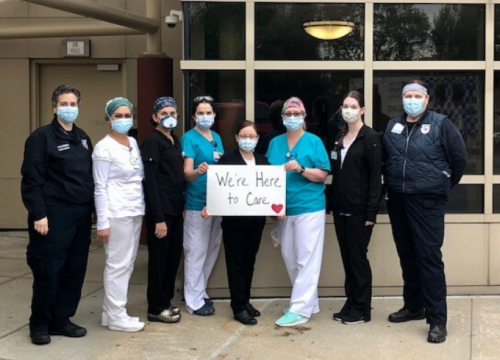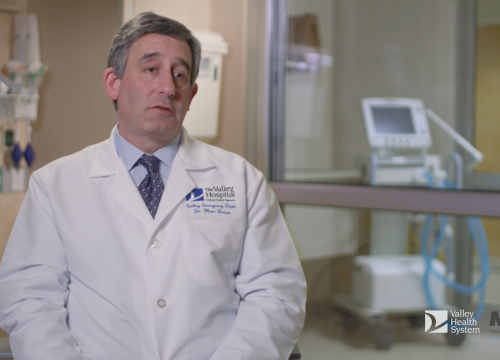Visitor Guidelines
Please check our Visiting Hours page for the latest Emergency Department visitation guidelines.
The Valley Hospital’s full-service Emergency Department is equipped to handle any type of emergency, using the highest safety precautions and protocols. All physicians on the active staff are board certified in emergency medicine, and many nurses are certified in emergency nursing.
Valley also offers a Pediatric Emergency Department which is open 24 hours a day, seven days a week to treat newborns, children, adolescents and young adults. With separate waiting areas and treatment rooms, the pediatric ED offers patients child-friendly evaluation and emergency treatment in a place that was created just for them.
Is it an Emergency?
If you're experiencing serious symptoms, trust your gut and seek emergency medical services right away. Prompt evaluation and treatment is critical to having the best possible health outcome.
What to Expect at the ED
When you arrive in the Emergency Department, our staff at the reception desk will ask several questions and begin a record of your visit. You may be directed to the reception area before seeing a triage nurse.
Wait Times
The Emergency Department staff works hard to provide prompt care, but you may still experience a wait. Your wait will depend on:
- The nature of your condition
- How busy the department is when you arrive (evenings, weekends, and holidays are our busiest times)
- The number of persons in the Emergency Department who require immediate treatment for serious conditions
After you have been seen by a physician, you may need to wait for X-rays or laboratory results.
Triage
A specially trained triage nurse will begin assessing your condition. He or she will ask you questions about your illness or injury and take your blood pressure, pulse, and temperature. Under the guidance of a physician and standard protocols, the triage nurse can begin your care immediately. Medicine for pain or fever may be given and X-rays ordered right away. The triage nurse will ask for a list of your current medications.
The triage process helps our Emergency Department staff decide which patients should be treated first. All our patients are evaluated in this manner. Of course, patients with life-threatening illnesses are given top priority.
Treatment
In the treatment area, you’ll be asked about your medical history and undergo a physical examination. Tests such as blood work, X-rays or a CT scan may be ordered. Our electronic tracking system allows our diagnostic imaging staff to see and respond to exam requests.
If a CT scan is ordered, you may be given a special drink called contrast. It is important to drink all of the contrast. Ask your doctor or nurse for medication if it upsets your stomach.
The emergency staff will regularly keep you informed. If you need help at any time, press the call button for assistance.
Our registration staff will visit you at your bedside to complete the registration process. They will make sure the information in your record is accurate. This includes your name, address, contact and insurance information.
Pain Management
We will make every effort to control your pain. However, pain medication can hide symptoms of certain illnesses. As a result, we may have to wait to give you pain medication until after the physician, nurse practitioner or physician assistant examines you. Please let us know if you’re in pain, because we may be able to offer something to make you more comfortable until medication can be given. As soon as it’s safe for you to receive pain medicine, we’ll have it ready for you.
Visitors
Current visitation restrictions prohibit visitors in the Emergency Department, except for patients in our Pediatric Emergency Department (one parent is allowed to remain with their child).
Eating and Drinking
If you are a patient in the Emergency Department, please do not eat or drink until you have been seen by a physician. Many tests require that you do not eat or drink. Please check with your nurse before you eat or drink anything.
Personal Belongings
You are responsible for your belongings, including clothing, pocketbook, wallet, dentures, cell phones and hearing aids. Please give these items to your family members for safekeeping. A belongings bag is provided for your convenience.
Discharge
Your caregivers will discuss your discharge plans with you. Specific instructions for follow-up care will be given to you in writing, along with any needed prescriptions. If you have any questions about your care or instructions, be sure to ask.
Once you have left the Emergency Department, fill your prescriptions as soon as possible and follow the instructions for taking them. For your convenience, you may have your prescription filled at Valley’s on-site retail pharmacy before you leave the hospital.
Co-Pay
The Emergency Department collects co-pay fees at the time of service. Please ask your registrar for more information.
























